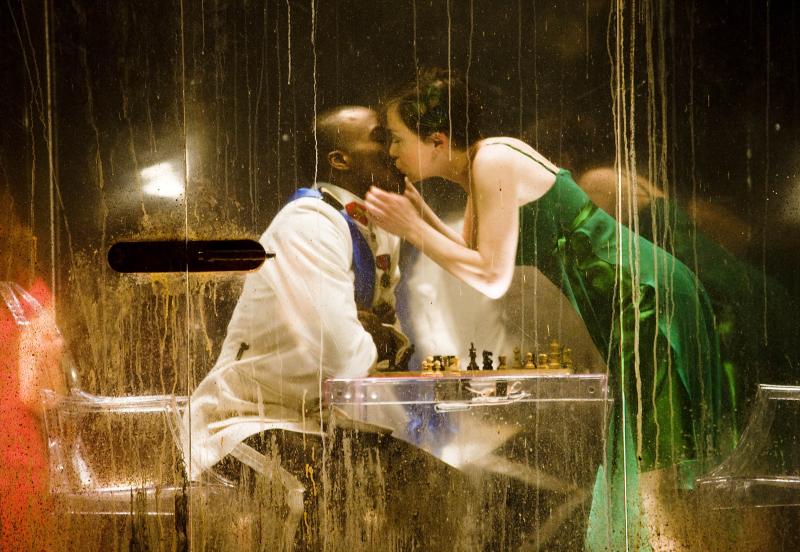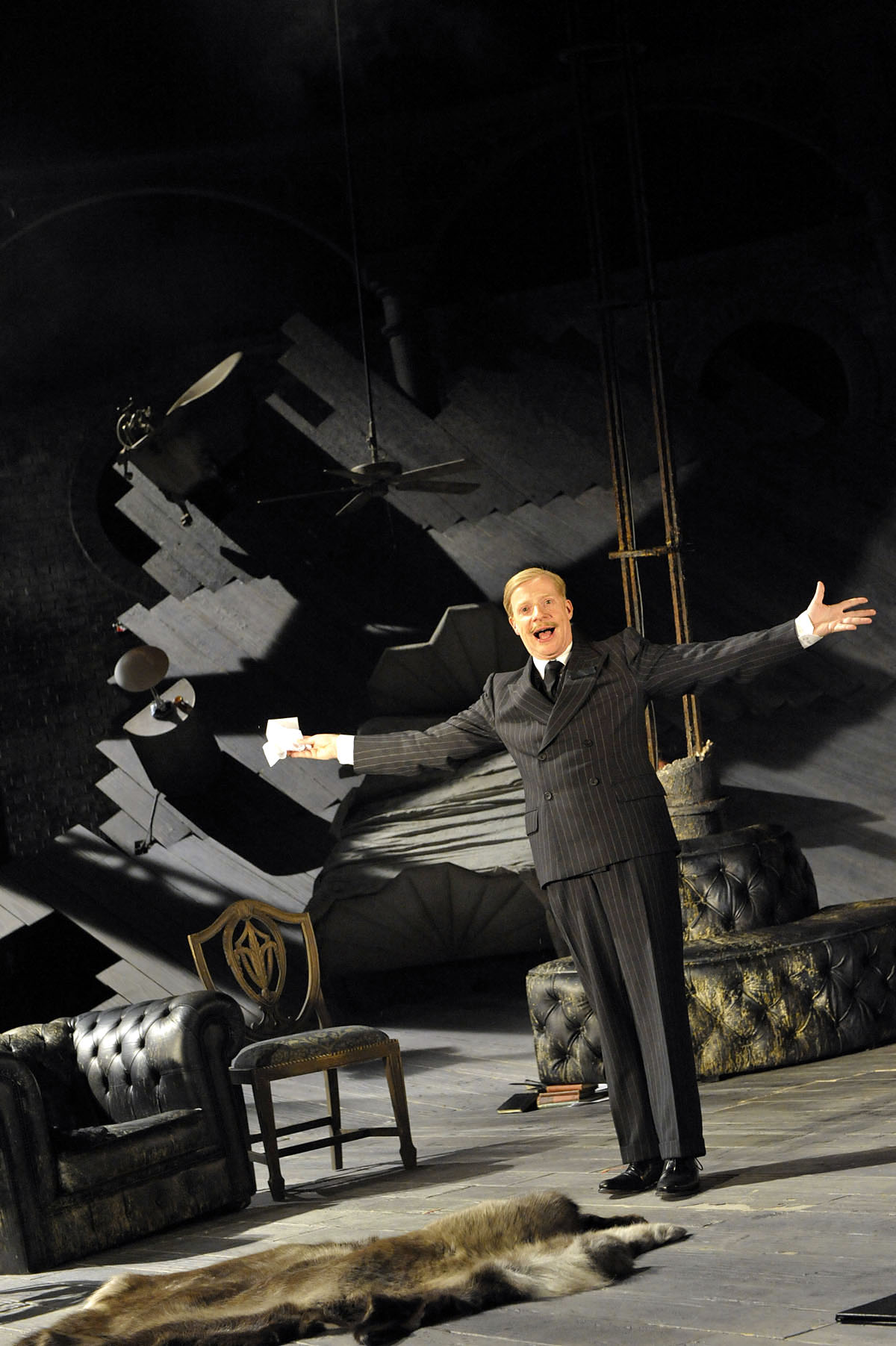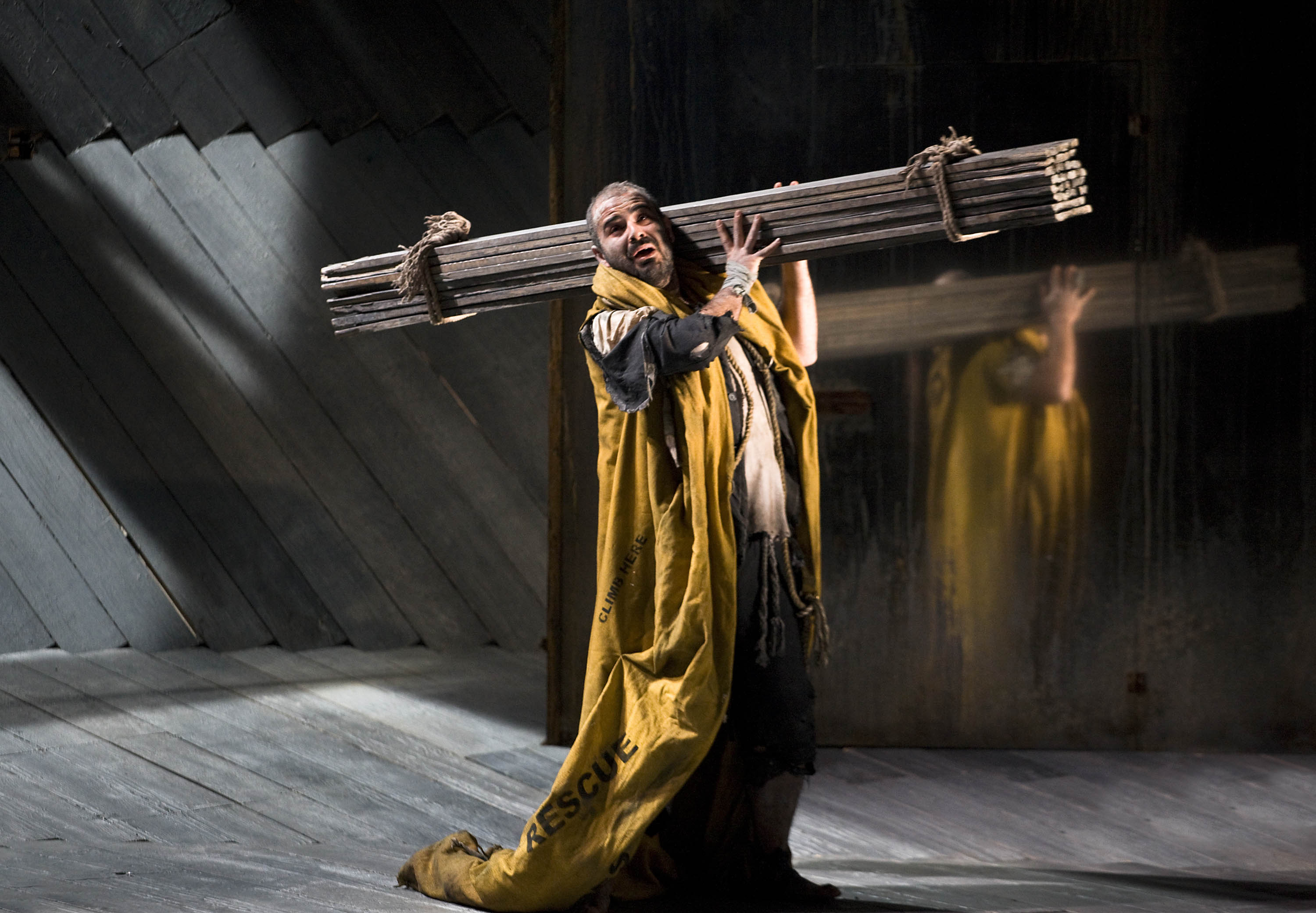Twelfth Night/The Tempest, RSC, Roundhouse | reviews, news & interviews
Twelfth Night/The Tempest, RSC, Roundhouse
Twelfth Night/The Tempest, RSC, Roundhouse
The RSC's trio of shipwreck plays offer a watery journey through Shakespeare's career

The RSC’s Twelfth Night dumps its audience unceremoniously onto the shores of Ilyria in the thump and beat of waves. While Viola struggles from the (very deep and very real) water, asking “What country friends is this?”, we by contrast find ourselves in familiar territory. Like this season’s opener, A Comedy of Errors, both Twelfth Night and The Tempest take their birth in the water.
Jon Bausor’s designs are a miracle of twisted ingenuity, defeating perspective from every angle. A run-down resort hotel that could play host to Key Largo or Death in Paradise equally well spreads itself through 270 degrees, extending from the battered club armchairs and drinks-laden piano of the foyer to a bedroom with lazily rotating ceiling fan and bathtub.
Kevin McMonagle’s lugubrious lounge-crooner of a Feste is chief among the grotesques
Within this warped world Sir Toby (Nicholas Day) become a Hawaiian shirt-sporting lush, Sir Andrew (Bruce Mackinnon) a bumbling young toff and Malvolio (Jonathan Slinger) the manager, complete with golf buggy (“For the use of the management only”) and clipboard. It’s a conceit that generally holds up all the better for not being pushed too hard, though it rather seems to run out of steam where Orsino and Olivia are concerned.

Fortunately it’s a weight Day et al can more than bear. Kevin McMonagle’s lugubrious lounge-crooner of a Feste is chief among the grotesques, offering a profoundly sinister twinge in his encounter with the imprisoned Malvolio (Slinger, pictured right) on finest, most unsettling form, but getting the longest applause for turning the throwaway “You shall know more hereafter” into a sight-gag involving bare buttocks), while Mackinnon’s physical clowning and Day’s deviant way with phrasing all fill out the bleak comedy.
The undercooked emotions of the opening acts are exposed as raw in the dénouement, whose only dramatic kick comes in a final tableau that places all four lovers in one bed – a belated statement about the play’s sexual politics?
A chess set dominates the foreground of Bausor’s set for Twelfth Night – pointedly unused, except when cast violently to the floor in the final Act – surely a glance ahead to The Tempest and the triptych’s final panel, where passionate confusion at last gives way to reasoned order.
The physicality of Twelfth Night with its water-tank and slapstick here gives was to interiority. A Hokusai-inspired animation finds the sea at its most powerful, but also its most rarefied – the idea of a wave, rather than a wave itself. Key moments of action – the opening shipwreck dialogue, Ferdinand and Miranda’s game of chess – are banished to the glassy cage of Prospero’s “cell”, withdrawn from the audience. Only the spirits in their masque offer a generous spectacle, painting the washed-out greys of Bausor’s apocalyptic set briefly with colour and texture.
 Farr’s Tempest is an altogether more delicate affair than the director’s Twelfth Night, with the tone set by Slinger’s Prospero. A sweating, dusty master in tattered suit and shirt, schooling Miranda (Taaffe) at a makeshift desk, there’s little dignity here. In its place we get a bitterness and fragility that from his first speech sets us up for an utterly sincere “But this rough magic I here abjure”. Ariel (Sandy Grierson) becomes his ghostly double, echoing Slinger’s broken pathos in an unusual scene of farewell, tending one last time – willingly – to his master, tenderly helping him with the buttons of his unfamiliar clothes.
Farr’s Tempest is an altogether more delicate affair than the director’s Twelfth Night, with the tone set by Slinger’s Prospero. A sweating, dusty master in tattered suit and shirt, schooling Miranda (Taaffe) at a makeshift desk, there’s little dignity here. In its place we get a bitterness and fragility that from his first speech sets us up for an utterly sincere “But this rough magic I here abjure”. Ariel (Sandy Grierson) becomes his ghostly double, echoing Slinger’s broken pathos in an unusual scene of farewell, tending one last time – willingly – to his master, tenderly helping him with the buttons of his unfamiliar clothes.
For all his restraint, Slinger is never less than emotionally clear, but his efforts are muddied by a rather confused Caliban from Amer Hlehel (pictured above). Grasping neither the moments of poetry, nor the ferocity of his hatred (and with diction often obscured), Hlehel is overpowered by the comedic double-act of Mackinnon (Stephano) and Felix Hayes’ Trinculo, who appropriate the character almost entirely for their subplot, leeching energy from his relationship with Prospero.
While linguistic traces of gender confusion do linger in the spoken text, a cross-cast Kirsty Bushell as Sebastian works dramatically very well in partnership with McGuinness, brittle once again as the foppish Antonio. The scheming pair offer a suitably sour contrast to Solomon Israel’s ingenuous Ferdinand.
For all the vigour and zest of Twelfth Night, Slinger’s Prospero proves the emotional core of this trilogy. Rich and strange indeed, the fallible magus and his surrender of power take us the final few steps from the streets of Ephesus to another world – a sea-change more of spirit than surroundings.
rating
Buy
Explore topics
Share this article
The future of Arts Journalism
You can stop theartsdesk.com closing!
We urgently need financing to survive. Our fundraising drive has thus far raised £49,000 but we need to reach £100,000 or we will be forced to close. Please contribute here: https://gofund.me/c3f6033d
And if you can forward this information to anyone who might assist, we’d be grateful.

Subscribe to theartsdesk.com
Thank you for continuing to read our work on theartsdesk.com. For unlimited access to every article in its entirety, including our archive of more than 15,000 pieces, we're asking for £5 per month or £40 per year. We feel it's a very good deal, and hope you do too.
To take a subscription now simply click here.
And if you're looking for that extra gift for a friend or family member, why not treat them to a theartsdesk.com gift subscription?
more Theatre
 Troilus and Cressida, Globe Theatre review - a 'problem play' with added problems
Raucous and carnivalesque, but also ugly and incomprehensible
Troilus and Cressida, Globe Theatre review - a 'problem play' with added problems
Raucous and carnivalesque, but also ugly and incomprehensible
 Clarkston, Trafalgar Theatre review - two lads on a road to nowhere
Netflix star, Joe Locke, is the selling point of a production that needs one
Clarkston, Trafalgar Theatre review - two lads on a road to nowhere
Netflix star, Joe Locke, is the selling point of a production that needs one
 Ghost Stories, Peacock Theatre review - spirited staging but short on scares
Impressive spectacle saves an ageing show in an unsuitable venue
Ghost Stories, Peacock Theatre review - spirited staging but short on scares
Impressive spectacle saves an ageing show in an unsuitable venue
 Hamlet, National Theatre review - turning tragedy to comedy is no joke
Hiran Abeyeskera’s childlike prince falls flat in a mixed production
Hamlet, National Theatre review - turning tragedy to comedy is no joke
Hiran Abeyeskera’s childlike prince falls flat in a mixed production
 Rohtko, Barbican review - postmodern meditation on fake and authentic art is less than the sum of its parts
Łukasz Twarkowski's production dazzles without illuminating
Rohtko, Barbican review - postmodern meditation on fake and authentic art is less than the sum of its parts
Łukasz Twarkowski's production dazzles without illuminating
 Lee, Park Theatre review - Lee Krasner looks back on her life as an artist
Informative and interesting, the play's format limits its potential
Lee, Park Theatre review - Lee Krasner looks back on her life as an artist
Informative and interesting, the play's format limits its potential
 Measure for Measure, RSC, Stratford review - 'problem play' has no problem with relevance
Shakespeare, in this adaptation, is at his most perceptive
Measure for Measure, RSC, Stratford review - 'problem play' has no problem with relevance
Shakespeare, in this adaptation, is at his most perceptive
 The Importance of Being Earnest, Noël Coward Theatre review - dazzling and delightful queer fest
West End transfer of National Theatre hit stars Stephen Fry and Olly Alexander
The Importance of Being Earnest, Noël Coward Theatre review - dazzling and delightful queer fest
West End transfer of National Theatre hit stars Stephen Fry and Olly Alexander
 Get Down Tonight, Charing Cross Theatre review - glitz and hits from the 70s
If you love the songs of KC and the Sunshine Band, Please Do Go!
Get Down Tonight, Charing Cross Theatre review - glitz and hits from the 70s
If you love the songs of KC and the Sunshine Band, Please Do Go!
 Punch, Apollo Theatre review - powerful play about the strength of redemption
James Graham's play transfixes the audience at every stage
Punch, Apollo Theatre review - powerful play about the strength of redemption
James Graham's play transfixes the audience at every stage
 The Billionaire Inside Your Head, Hampstead Theatre review - a map of a man with OCD
Will Lord's promising debut burdens a fine cast with too much dialogue
The Billionaire Inside Your Head, Hampstead Theatre review - a map of a man with OCD
Will Lord's promising debut burdens a fine cast with too much dialogue

Add comment